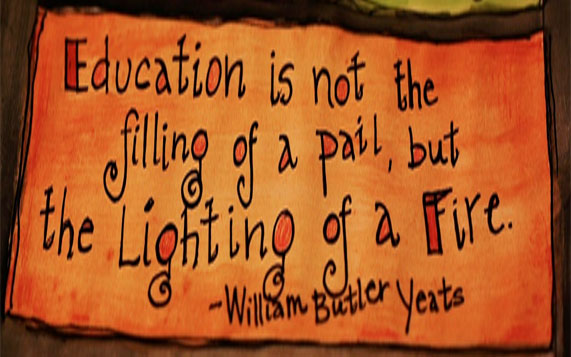
As a teacher, I place a tremendous amount of trust in the wisdom of great people that have come before me. When I read the above quotes, I am inspired to teach my students to love learning. Education is not how much we “put in the bucket” or how much material we cover, but rather, how much we inspire the students to fill the bucket on their own. A dentist does very little to prevent cavities, but their advice is what inspires us to brush and floss in order to avoid them. Much like a teacher inspires a class to want to learn. My high school Spanish teacher taught me very little of the Spanish I currently speak today with my wife and family, but she planted the seed of excitement to want to learn Spanish. So how much Spanish did that one teacher actually teach me? Very little, but she taught me to be a lifelong learner and to have love for the Spanish language.
As a high school teacher, I have 6 classes that I only see 180 times for 49 minutes (minus the countless hours of class-time missed due to required state tests and test prep). This is not nearly enough time to “fill the bucket” with all the required information. What I need to do is inspire them to go outside of my classroom with a desire to continue learning. Unfortunately, this is nearly impossible to measure, so states have begun creating lists of “standards” that we follow to fill up the bucket. With as many as 150 kids and our career depending on it, it’s all I can do to just simply have the students memorize the list of state standards. However, what teachers should do is simply inspire the kids to love the content and the bucket will fill on its own.
With the demands the state puts on teachers to “prove teachers are filling the bucket” we are forced to teach students meaningless, easily testable, low-level information that they can regurgitate on the State tests. I know they are trying to create tests that “align with the common core” but in reality, this is yet another list of “things to teach.”
A successful student will pass a state test?
Or…
A successful student will transform into a lifelong learner that has a passion for learning and an ability to apply learned knowledge to novel situations.
We need to take a stand against toxic testing and what it is doing to the minds of our children. We see the effects in our classrooms daily. Students can no longer apply knowledge learned to novel situations. Students do not learn how to learn. Students do not retain learned information as we have trained them to memorize, regurgitate, and then make room for the next “standard”. How can our future governors, senators, CEOs, employees handle diverse situations that we haven’t specifically trained them to handle? Unfortunately, we have shifted our focus to programming our kids like robots to regurgitate useless information on a state mandated test, while at the same time, private companies are spending billions to program robots to think for themselves.
By Christopher Gibfried, Winton Woods Teachers’ Association Vice President


